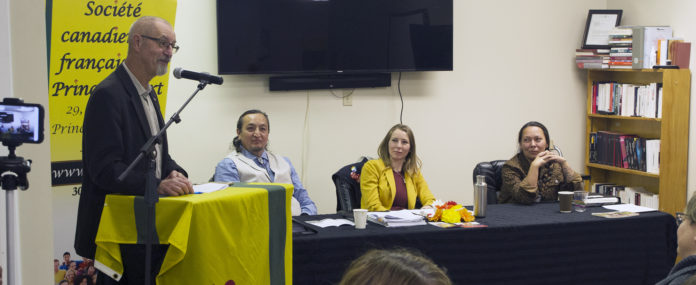
Michel Dubé has deep roots in Saskatchewan.
His grandfather was one of the first French-speaking politicians in the Saskatchewan legislature, and Dubé himself is a former president of the Societé Canadienne Française dePrince–Albert(SCFPA). He’s worried however, about the next generation of francophone residents. Will they stay rooted in Saskatchewan as he has?
“Whether we like it or not, the francophone population is getting older,” he says. “It’s a lot of retirees and the younger people aren’t making kids like they used to.”
Opportunities for French-speaking Saskatchewan residents is one of Dube’s biggest concerns as he prepares to vote in the next federal election. On Friday, he was one of dozens of local francophone residents who crammed into the SCFPA offices to hear from candidates Estelle Hjertaas (Liberal), Harmony Johnson-Harder (NDP) and Brian Littlepine (VCP).
For Dubé, those opportunities start with French-language post-secondary education. The K-12 system is thriving, he explains, but without post-secondary opportunities, those students are heading out east.
Dubé’s daughter is one of them. She moved to Montreal to complete her studies, and it’s unlikely she’s coming back to Saskatchewan.
“We’re losing those people,” Dubé says. “We’ve educated them throughout their whole lives. Our taxes, our system has paid for that, then they disappear and they don’t come back to the province that educated them. That’s got to change.”
The solution to this problem isn’t easy. Tom Michaud, one of two Prince Albert deputies on the provincial francophone governance council Assemblée Communautaire Fransaskois, says creating those post-secondary opportunities would require tens of millions of dollars. Like Dubé, Michaud wants to see more of those opportunities, but he’s not sure how quickly it’s going to happen.
“Significant is the word I would use,” Michaud chuckles when asked how much government investment those opportunities would require. “The initial step I’m looking for is just a firm commitment, even if it is just in the single digit millions. If it’s going to be concrete and it’s going to contribute, (and) continue to enhance supports and services going forward, then I’ll take that as a good first step.”
French-language post-secondary opportunities are a big concern for those in attendance, but not the only one. Many want to see political parties focus on updating the Official Languages Act, something that hasn’t been done since 1988. Others are concerned that Canada hasn’t taken in enough francophone immigrants. Some provinces, like Ontario, have set targets for making sure a certain percentage of immigrants are from francophone countries. Some in attendance are worried those targets aren’t being met.
Despite this election campaign being one of the most combustible in recent memory, both Michaud and Dubé are confident most politicians understand which issues are important to francophone voters who don’t live in Quebec. It’s just a matter of turning that knowledge into action.
“You’ll here more about it in Ontario because of the critical votes that are to be had there in that province, and the high number of francophone and French speaking citizens who vote in Ontario,” Michaud says. “Here in Saskatchewan, we don’t have the same demographic pull and influence, so I’m not surprised to see it’s not high on the list of priorities. At the same time, as a francophone myself, I still have a responsibility to make sure that our politicians are aware of our needs.”

